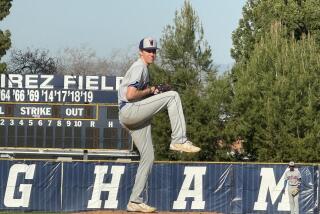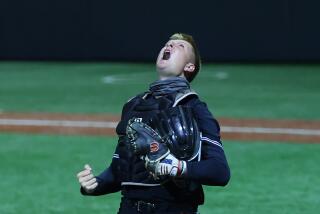Bat Master
- Share via
He is the big guy who when he steps into the batter’s box, the shortstop turns to the outfielders and waves them back. Waaaay back.
He is the guy who suddenly appears on the roster, filling in for someone who is “absent.” The ringer.
Dennis Burbank knows that. He is comfortable with it. And then he hits the ball over everyone’s head.
Burbank, a former Valencia High and Cypress College baseball standout, is among a handful of recreational players nationwide endorsed by Louisville Slugger.
Everywhere he goes--from tournaments in Las Vegas to Seattle--he’s toting Louisville Slugger gear, making a name for himself and the company he represents.
But he’s not doing it as a baseball player. Most of the time, he’s playing slow-pitch softball, a surprising notion when he took up the game in the spring of 1995 playing on a coed team with his wife, Julie.
“To me, softball players were beer-gutted guys who couldn’t make it playing baseball,” said Burbank, whose parents still live in Anaheim though he calls Boise, Idaho, home. “My wife convinced me to at least try. As competitive as she was at softball, I said, ‘OK, I’ll give it a shot.’ ”
A star was born.
“The first day out, I was hitting the ball 350 feet and people were saying, ‘Would you mind playing for us once in a while?’ ” Burbank recalled, laughing.
Steve Dailey, a teammate of Burbank’s on the Oklahoma State team that reached the 1990 College World Series, worked for Louisville Slugger. Dailey heard through the grapevine that Burbank, who pitched for the Cowboys, had developed into quite a power hitter. They talked.
“[Dailey] knew some people and checked to see if I was blowing smoke,” Burbank said. “He said, ‘If you use Louisville Slugger products exclusively in any home run hitting contest or any tournaments, we will make sure you have everything you need.’ ”
A pitchman was born.
“To me, hitting is about leverage, and at 6-foot-6, 240 pounds, I create a little bit of leverage,” Burbank said.
He said he has gone “through 15 to 20 [$300 aluminum triple wall] bats” this season alone.
“The balls we use continue to get harder and harder,” Burbank said. “I generate enough bat speed, when I make good contact, I put a half-inch dent on the bat. I’ll use the same bat until the umpire will throw it out of the game. But I can go through four or five bats in one tournament.”
Burbank had 128 home runs in 65 games last year for his Boise team. He also had 211 runs batted in.
This season, he has 95 homers in 48 games. He has another 60 or so playing on a coed team, but he doesn’t really count those.
Burbank’s wife is also sponsored by Louisville Slugger. Julie Dobbs was the cover girl of the 1991 Women’s College World Series softball program. She was the starting shortstop for four years at Oklahoma.
“Pound-for-pound, she’s way better than I am,” Burbank said of his 5-6, 115-pound wife.
Dennis Burbank plays four nights a week and then plays ASA- and USSSA-sanctioned tournament games on weekends.
He is batting .780. His deal with Louisville Slugger is for equipment only. He works as a public relations manager for a company that manufactures engineered lumber products.
“I feel I could play independent league baseball,” Burbank said, “but there’s no future in it for a 29-year-old right-handed pitcher who throws 85 mph.
“I had to make the conscious decision a number of years ago to develop myself into a quality business person, and as much as I miss playing baseball, I feel I’ve turned into a pretty good businessman.”
Burbank’s professional career ended in the independent Northern League playing for Sioux City after three seasons in the Yankee organization.
He had some talent, certainly. He was drafted in the 26th round by the Twins after graduating from Valencia High in 1987. He played one year at Pepperdine, then transferred to Cypress College, where he was drafted in the 10th round by the Dodgers.
But he didn’t sign.
“I wanted more money,” Burbank said. “I didn’t realize at the time what being drafted that high meant; it assured me that I would have the opportunity of playing for a long time. I didn’t realize that.”
But after turning his back on the majors twice, Burbank gave the impression of being disinterested.
Though he was an All-American at Oklahoma State his junior season (10-2, 3.19 earned-run average), losing to Georgia, 2-1, in the College World Series final, he was not drafted.
Burbank returned for his senior season in 1991 and was again an All-American. He finished 13-3 and helped the Cowboys reach the finals of the NCAA Central Regional, where they lost to Long Beach State. But he was drafted in only the 29th round by the Yankees.
His OSU coach was Gary Ward, considered one of college’s premier hitting instructors. Ward emphasized bat speed through the point of contact, a theory Burbank has used effectively in softball.
“I don’t go up [to bat] with the idea that this ball is going to leave the yard,” he said. “I just try to hit the ball hard, because if it’s a line drive, it’s probably going to leave the yard.”
More to Read
Go beyond the scoreboard
Get the latest on L.A.'s teams in the daily Sports Report newsletter.
You may occasionally receive promotional content from the Los Angeles Times.










